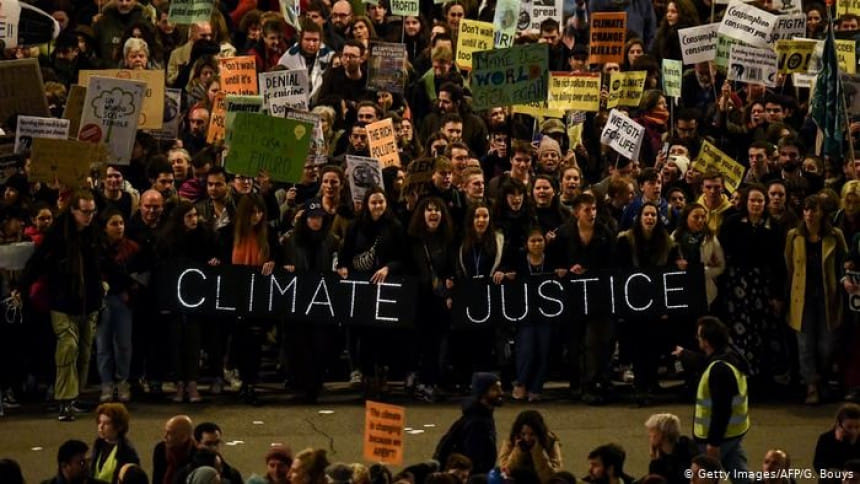Perils of climate change: Time for action

The 25th session of the Conference of the Parties (COP 25) to the United Nations Framework Convention on Climate Change (UNFCCC), known as the UN Climate Change Conference COP25, has been taking place in Madrid from December 2-13, 2019, under the presidency of the Chilean government and with logistical support from the Spanish government. Leaders and representatives from across the world—with the notable absence of the US President Donald Trump—gathered at the UN Climate Change Conference in the Spanish capital. However, the House Speaker Nancy Pelosi is leading a bicameral Congressional Delegation to the annual international climate summit on behalf of the United States Congress.
The climate summit in Madrid is being held shortly after the emergence of some crucial issues at the forefront related to global climate change. First, the United Nations Environment Programme (UNEP) released its annual report on "emissions gap" referring to "commitment gap" on November 26 this year. The UNEP in a new report also warns that the world will fail to get on track towards 1.5 degrees Celsius temperature goal of the Paris Agreement, unless the emissions of global greenhouse gas fall by 7.6 percent in each year between 2020 and 2030.
The report shows that despite the pledges by several countries, the amount of greenhouse gases is increasing at an alarming rate, where it urges for deeper and faster cuts of Greenhouse Gas (GHG) emissions. It should be noted that the global temperature is already 1.1 degrees Celsius warmer and has been warned to rise by 3.4 to 3.9 degrees Celsius in this century if current trends persist, and that may result in wide-ranging and destructive climate impacts, including extreme weather, droughts and storms across the globe. Besides, the World Meteorological Organization (WMO) reports that, the period from 2010 to 2019 is "almost certain" to be the hottest decade on record and 2019 to be the second- or third-warmest year since 1850.
Second, the European parliament declared a global "climate and environmental emergency" on November 28, 2019, calling for all European countries to fight against the existential threat of climate crisis and commit net zero greenhouse gas emissions by 2050. Third, thousands of global climate protests took place in 153 countries just few days before the COP25 urging the global leaders to take stronger and collective steps on fighting global climate change.
It is important to mention that earlier the parties to the UNFCCC reached a landmark agreement, known as Paris Agreement on climate change, at COP21 held on December 12, 2015, bringing all nations into a "common cause" for the first time with the crucial objectives of combating climate change with sincere and collective efforts, limiting global warming and accelerating as well as intensifying the actions and investments needed for a sustainable low carbon future. As per the vision, the world leaders agreed to hold the increase in the global average temperature to well below 2 degrees Celsius above pre-industrial levels and pursue efforts to limit the increase of temperature to 1.5 degrees Celsius above pre-industrial levels laid out in the Paris Agreement.
Given this backdrop, the world leaders endeavoured to discuss the effective ways of tackling the climate crisis. Most crucially, the UN Climate Change Conference COP25 sets the clarification of rules for all participating states in fulfilling the agreed goal of limiting global warming to below 2 degrees Celsius in line with the Paris Agreement. The climate summit also underscores the urgency of taking the next crucial steps in the UN climate change process.
Being disappointed with the global efforts in limiting emissions and the countries' heavy reliance on coal production, the UN Secretary General Antonio Guterres mentioned in his opening address, "…Do we want to be remembered as the generation that buried its head in the sand and fiddled as the planet burned?" As far as the rising temperature is concerned, he has urged for the limited use of fossil fuels to control the temperature of the planet. The head of the UN has also articulated two paths-such as "the point of no return" and "carbon neutrality by 2050" with collective efforts to face the fast-rising perils of a global environmental challenge and win the war against climate change.
Controversial carbon markets also take centre stage at the COP25 climate conference in order to build a regulatory framework for a global carbon trading system. The participating countries at the earlier session of COP24, in Katowice, held in Poland last December, could not reach an agreement on the implementation of Article 6 of the Paris Agreement—integrated, holistic and balanced approaches to assist governments in implementing their nationally determined contributions (NDCs) as well as voluntary international cooperation by paying global price on carbon to GHG emissions reduction targets. This is why much attention has been paid to the full operationalisation of the Paris Agreement to facilitate carbon trading or emissions trading for tackling greenhouse gas emissions.
Bangladesh's Prime Minister Sheikh Hasina has also attended the "Heads of State and Government Summit" of the annual climate summit and urged the global community to address the needs of climate migrants under an appropriate framework at the opening session of COP25. She has also called for facilitating climate finance for the vulnerable countries to the impacts of climate change based on the principle of "common but differentiated responsibility".
The UN Climate Change Conference COP25 kicked off in Madrid with increased ambition and commitments. The summit urges for making serious progress on climate action over the next sessions. Leaders from over 200 countries have pledged for "green revolution" on the first day of the COP25 climate summit to combat the devastating effects of global warming. Delegates have reiterated deep cuts to emissions (over 7 percent each year) and adopt cleaner technologies at a faster rate.
On behalf of the House of Representatives and the Congress of the United States, Nancy Pelosi has reaffirmed the US' commitment to fulfilling its goals of combating the climate crisis despite its formal withdrawal from the Paris climate accord. Poland, one of Europe's largest coal producers with its dependency on fossil fuels for 80 percent of the country's energy, has reaffirmed its goal to redouble efforts to cut carbon gas emissions and develop new clean energy sources.
Hence, the consensus on putting a price on carbon and markets-based concept of emissions trading through the full operationalisation of Article 6 of the Paris Agreement seem crucial for limiting the rise of global temperature and tackling existential threats of climate change. Most importantly, the call for ensuring at least USD 100 billion a year to developing countries to reduce greenhouse gas emissions and to build resilience to climate change reiterates the urgency of combating the perils at hand with collective, but sincere efforts.
Sultana Yesmin is a PhD Candidate, School of Politics and International Studies, Central China Normal University (CCNU), Wuhan, Hubei, China.

 For all latest news, follow The Daily Star's Google News channel.
For all latest news, follow The Daily Star's Google News channel. 








Comments